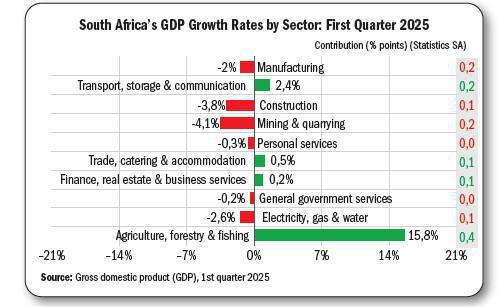The following are some of the key factors shaping South Africa’s current economic climate:
Government of National Unity ("GNU")
After the GNU was formed during 2024, there was an atmosphere of hope and confidence for the economy in South Africa. During the first half of 2025, however, the feeling has been that the GNU has brought about a mixed impact on the economy. While the GNU has fostered political stability and potentially boosted business confidence, some economists warn that uncertainty surrounding the GNU could negatively affect investor sentiment and economic growth.
Energy Security
Eskom’s commitment to ending load shedding has eased the strain on businesses. In addition, the introduction of private sectors into the electricity market has further increased stability and confidence.
Inflation & Interest Rates
The Consumer Price Index inflation rate dropped to 3.0% in November 2024, presenting the opportunity for interest rate cuts, and on the 30th of January 2025, the Monetary Policy Committee reduced the prime lending rate to 11.0%. Lower borrowing costs for businesses and households could increase economic activity and encourage investment.
Household Spending
According to statistics released by Statistics South Africa in January 2025, households spend 76.0% of their income on housing, water, electricity, gas, food, non-alcoholic beverages, transport, and insurance. With reduced interest and inflation rates, households will have increased spending power to allow economic growth.
Economic Growth
South Africa’s Gross Domestic Product is projected to grow at a modest 1.6%, indicating a slow yet positive recovery. This growth is dependent on the implementation of policies that drive economic expansion and enable job creation. Improvements in infrastructure, regulatory efficiencies and targeted sectoral interventions could accelerate growth.
Key facts on South Africa
Languages: 12 official languages of equal status: Afrikaans, English (language of commerce, banking, government and official documentation), isiNdebele, isiXhosa, isiZulu, Sesotho sa Leboa, Sesotho, Setswana, siSwati, Tshivenda, Xitsonga and sign language.
Capital cities: Tshwane (Pretoria) – administrative, Cape Town – legislative, and
Bloemfontein (to be renamed Mangaung) – judicial.
Form of State: Federal state comprising a national government and nine
provincial governments.
Legal system: Based on Roman-Dutch Law and the 1996 Constitution.
General: internet domain: .za, metric system, time zone: GMT+2
The South African Economy
Currency: One Rand (R) = 100 cents. International symbol: ZAR
GDP Growth Rate: +0.1% q/q (Q1 2025)
PPI : +1.1% y/y (at January 2025)
CPI: 3% y/y (Q1 2025)
Unemployment: 46.1% for ages 15 to 34 years, and the current official national rate stands at 32.9% (Q1 2025)
Key industries: Mining (world’s largest producer of platinum and chromium), automobile assembly, metal-working, machinery, technology, IT, textiles, iron, steel, chemicals, fertilizers, foodstuffs, commercial ship repair.
Exports: Gold, minerals, diamonds, wines, fruits, platinum, other metals and metal products, automotive components, machinery.
Imports: Machinery (including computers), transport equipment, manufactured goods, chemicals, mineral fuels including oil, scientific instruments, medical apparatus, pharmaceuticals.
Main trading China (18%), Germany (12%), USA (6.8%), India (4.2%),
partners: Saudi Arabia (3.8%,), Japan (3.5%).
DISCLAIMER: The material and information contained in this article is for general information purposes only. You should not rely upon the material or information in this article as the basis for making any business, legal or other decisions.


